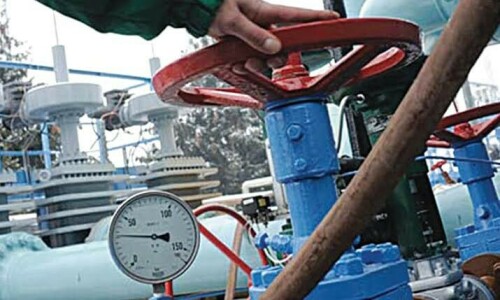ISLAMABAD: The State Bank has received $1.2 billion from the International Monetary Fund as the first tranche of a $3bn bailout, Finance Minister Ishaq Dar said on Thursday, a day after the IMF’s board approved the nine-month package.
With this inflow, the central bank’s foreign exchange reserves have jumped by $4.2bn this week, as the country also received $1bn from the United Arab Emirates and $2bn from Saudi Arabia.
The transfer of $1.2bn from the IMF “will further improve our foreign exchange reserves”, the minister said in a televised statement, adding that the lender’s executive board had approved the programme on Wednesday, the details of which had already been shared with citizens.
Mr Dar said that while finalising the $3bn standby arrangement — an IMF’s economic programme that provides short-term financial assistance to countries facing balance-of-payments problems — the two sides had agreed to an upfront disbursement of $1.2bn, followed by the remaining $1.8bn through two quarterly reviews in November and February.
The total foreign exchange reserves, he said, would close at somewhere between $13bn and $14bn when the central bank releases its consolidated statement after settling payments and sovereign liabilities.
He said the standby arrangement had been limited to nine months so that a new government could take its own decisions after the upcoming elections.
He said apart from the efforts of the economic team that continued for eight months, Prime Minister Shehbaz Sharif had played a key role in securing a new shorter programme instead of the ninth review of the previous Extended Fund Facility (EFF), as it would have deprived Pakistan of $1.5bn out of the previously approved quota.
With the new short-term agreement, the government had been able to increase the programme’s size to $3bn by adding $500m on top of the $2.5bn outstanding share of the previous programme, he said.
Mr Dar said Pakistan had now returned to the path of fast-track progress and development and everybody should now make efforts to consolidate these gains further and shift the country to a positive growth trajectory.
The IMF said on Wednesday that the programme would focus on four key points, including the implementation of the 2023-24 budget to facilitate Pakistan’s fiscal adjustment and ensure debt sustainability while protecting critical social spending; a return to a market-determined exchange rate and proper foreign exchange market functioning to absorb external shocks and eliminate forex shortages; an appropriately tight monetary policy aimed at disinflation; and progress on structural reforms, particularly with regard to energy sector viability, governance of state-owned enterprises, and climate resilience.
Besides the spillovers from floods and commodity price shocks, the IMF managing director Kristalina Georgieva had also attributed economic challenges to “uneven policy implementation under the EFF” to halt the post-pandemic recovery, sharply increase inflation, and significantly depleted internal and external buffers. The new agreement “offers Pakistan an opportunity to regain macroeconomic stability and address these imbalances through consistent policy implementation”, she said.
Blinken welcomes IMF deal
Meanwhile, US Secretary of State Antony Blinken on Thursday welcomed the IMF’s approval of the short-term programme to support Pakistan, saying he stood by the Pakistani people during these hard times.
The chief US diplomat also urged Pakistan to continue working with the IMF towards macroeconomic reforms and sustainable economic recovery.
“We urge Pakistan to continue working with IMF toward macroeconomic reforms and sustainable economic recovery,” he tweeted.
Anwar Iqbal in Washington also contributed to this report
Published in Dawn, July 14th, 2023









































Dear visitor, the comments section is undergoing an overhaul and will return soon.